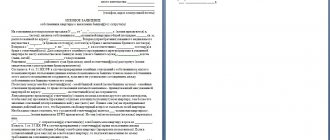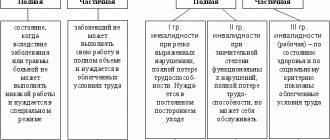Family members: concept
The family is under state protection. This is enshrined in Article 1 of the RF IC. It also says that marriage is registered with the civil registry office. In the family, all members manage the household and raise children. They have rights and responsibilities. Each family member has the right to living space. This is confirmed by Article 40 of the Constitution of the Russian Federation. But usually with a divorce there is a need to divide the premises, because no one’s rights should be infringed. The norms for this procedure are established by Article 38 of the RF IC. Most housing issues are resolved through the court, which makes it possible to divide the living space.
…husband and wife
However, there are a number of restrictions when, despite the will, a circle of direct relatives has the right to their obligatory share in the inheritance. This is especially true for minor children or dependents - spouses, parents, etc.
Don't have time to read the article?
However, you have to pay a notary fee and its amount depends largely on the degree of relationship. For loved ones it will be 0.3 percent if the total amount does not exceed one hundred thousand rubles. For other relatives it will cost twice as much, but the total amount should not exceed a million rubles.
Currently, there are no restrictions on the joint work of relatives with the exception of state and municipal employees. Why does the question of restrictions on accepting relatives arise at all? This is because when labor relations were regulated by the Labor Code, it clearly stated that the joint work of persons related to each other, subordinating one of them to the other, was prohibited. Modern legislation, represented by the labor code, states that there is no discrimination based on marital status, race, gender, nationality, language, etc. it can not be. And any violation of this legislation will be punished.
Who is a family member
According to paragraphs 1-3 of part 2 of article 1 of the Federal Law of the Russian Federation of December 30, 2012 N 283-FZ “On social guarantees for employees of certain federal executive bodies and amendments to certain legislative acts of the Russian Federation”, family members of the employee and citizen of the Russian Federation, dismissed from service in institutions and bodies, and persons who are (were) their dependents, who are subject to this Federal Law, unless otherwise established by separate provisions of this Federal Law, are considered: “On the provision of a one-time social payment for the acquisition or the construction of residential premises for employees of institutions and bodies of the penal system, the federal fire service of the State Fire Service, authorities for control of the circulation of narcotic drugs and psychotropic substances and customs authorities of the Russian Federation"
Who is considered a family member of an enterprise employee?
Family legislation establishes the conditions and procedure for marriage, termination of marriage and recognition of its invalidity, regulates personal non-property and property relations between family members: spouses, parents and children (adoptive parents and adopted children), and in cases and within the limits provided for by family law, between other relatives and other persons, and also determines the forms and procedure for placing children left without parental care into the family.* The Department of Tax and Customs Tariff Policy reviewed a letter on the issue of taxation of personal income tax on amounts of financial assistance paid by an employer to an employee in connection with the death of his brother (sister), and in accordance with Art. 34.2 of the Tax Code of the Russian Federation (hereinafter referred to as the Code) explains the following.
When to claim existing dependents
- Spouses. In this case, we are not talking about any spouse, but only about the one who has reached retirement age or has a disability. If the wife of her own free will decided to become a housewife, then she is not a dependent.
- Children. Dependents include both minor children and children under the age of 23 who are studying full-time at a university. In the latter case, the child should not work under an employment contract on a full-time basis. Adoptive parents and adopted children enjoy equal rights as parents and children. But it happens that children lose their status as incompetent before they reach adulthood. These are, for example, situations when a child enters into a legal marriage, receives the status of an entrepreneur, or officially gets a job.
- Parents, grandparents. The person's dependents are parents of retirement age who are disabled. Retired grandparents can be recognized as dependents in the absence of persons who are obliged to support them.
- Brothers, sisters and grandchildren (minors, adults, studying at a university under the age of 23) in the absence of able-bodied parents. If the parents are able to work, then they should provide for the brothers and sisters.
- Persons who are supported by virtue of a signed lifelong annuity agreement. Such persons become dependents in relation to an able-bodied relative: father, mother, spouse, brother, sister, grandson, son or daughter.
- They also distinguish between dependents in relation to the state. These are, for example, orphans and pensioners, students with financial support from the state and disabled citizens who are fully supported by the state.
Who are the employee's family members?
Federal Law of July 19, 2011 N 247-FZ “On social guarantees for employees of internal affairs bodies of the Russian Federation and amendments to certain legislative acts of the Russian Federation” was developed in development of the provisions of the Federal Law “On Police” and is aimed at regulating relations related with monetary allowances and pensions for employees of internal affairs bodies, provision of living quarters, medical care for employees, citizens dismissed from service in internal affairs bodies, and members of their families, as well as providing them with other social guarantees. Also, when deciding on the issue of classifying individuals as family members of an employee for the purpose of registering for receiving a one-time social payment, it is necessary to be guided by the norms of the Housing Code of the Russian Federation, however, when deciding on the issue of providing this payment, only persons who live together with the employee are included in the family members living together with the employee. specified in part 2 pp. 1 and 2 tbsp. 1 of the Federal Law of July 19, 2011 N 247-FZ “On social guarantees for employees of internal affairs bodies of the Russian Federation and amendments to certain legislative acts of the Russian Federation”
Please note => Extract from the registration chamber on the availability of property
Relatives working together is not prohibited
We also have Federal Law No. 119-FZ of July 31, 1995 “On the Fundamentals of the Civil Service of the Russian Federation,” in which Article 21 states: “A citizen cannot be accepted into the civil service and be in the public service in the following cases: 5 ) close relationship or relationship (parents, spouses, brothers, sisters, sons, daughters, as well as brothers, sisters, parents and children of spouses) with a civil servant, if their public service is related to the direct subordination or control of one of them to the other.
Close relatives - who are they?
So, hiring close relatives is permitted by the Labor Code of the Russian Federation; moreover, administrative liability is provided for the infringement of human rights based on his marital status when applying for a job. The exception is the work of persons who are closely related and employed in state and municipal enterprises. The work of relatives is limited in these institutions when one person is under the control of another.
Close relationship influences the possibility of obtaining permission to visit in a correctional facility. Blood relatives and spouses in this case have the same rights. However, if you have not registered your marriage, it will be difficult even for a close friend to meet with the convicted person.
The above rules are considered general. In practice, the list of persons included in this category may vary significantly depending on the branch of law. Initially, attention is paid to the presence of blood relationships. If it is not there, then the chance of participating in the division of property is reduced. So, nephews and nieces are considered relatives by blood, but a stepfather and a child of a husband or wife are not.
Who are family members for personal income tax?
You will also have to pay tax when real estate was received as a gift, for example, from an uncle or aunt, common-law or former spouse, stepfather, stepmother and other non-blood relatives. In a letter dated June 10, 2010 No. 03-04-05/10-323, the Russian Ministry of Finance explained that the list of income not subject to personal income tax established by Article 217 of the Tax Code is exhaustive. At the same time, the Code does not specify who should be understood as a member of the employee’s family for the purposes of exempting the specified financial assistance from personal income tax. In this regard, guided by the provisions of paragraph 1 of Article 11 of the Code, according to which the institutions, concepts and terms of civil, family and other branches of legislation of the Russian Federation used in the Code are used in the meaning in which they are used in these branches of legislation, to clarify the situation you should refer to the norms of the Family Code (hereinafter - FC). So, Article 2 of the Family Code defines that family members are: spouses, parents and children (including adoptive parents and adopted children). Accordingly, from the literal interpretation of this norm it follows that, for example, a grandmother and grandson are not family members.
Please note => How to make a deed of gift for a share in an apartment
justice pro...
The legislation contains special rules for persons who are or are recognized as family members. Therefore, it is important to know who is part of the family according to the Family Code from a legal point of view. In this article we will talk about the concept of “family members” in family law and answer frequently asked questions on this topic.
Family members by law
It is necessary to distinguish between the concepts of “family members” and “close relatives” (in the latter case the degree of relationship is important), as well as the concept of “interdependent persons”. Let us note that according to the Housing Code (when determining family members of a tenant of a residential premises under a social tenancy agreement and family members of the owner of a residential premises), the Law “On the Status of Military Personnel”, and the Family Code, different persons can be recognized as family members.
!!! Family composition may be determined by other regulations (depending on the goals established by these regulations).
The need to find out who is a family member under family law may arise, for example, when making a gift between close people. The fact is that income in the form of real estate (houses, apartments, etc.), cars are exempt from taxation when donated between close relatives and family members in accordance with the Family Code of the Russian Federation (when donating money between individuals, the obligation to pay tax does not arise regardless of whether the donor and recipient are family members and (or) close relatives).
Family members according to the Family Code
Let's find out who is part of the family according to the Family Code. The list of persons who are family members is given in Article 2 of the RF IC, dedicated to relations regulated by family law.
Family members are:
- spouses,
- parents and children (adoptive parents and adopted children).
Recognition as a family member in family law
Even if a loved one is not included in the list of family members under the Family Code, it is possible to recognize him as such in court. A systematic interpretation of the provisions of the Family Code of the Russian Federation allows us to include in the concept of a family member persons bound by mutual rights and obligations arising from marriage, kinship, and adoption. Recognition of a citizen as a family member is possible by the court in a special proceeding.
Thus, if the donor and the donee (for example, a stepmother and stepdaughter) are recognized by the court as family members, income in the form of donated real estate is exempt from taxation (Letter of the Ministry of Finance dated May 29, 2013 N 03-04-05/19591).
According to the Family Code, family members include spouses, parents and children, adoptive parents and adopted children
We will answer questions that are often asked about family composition according to the Family Code.
Is Grandmother a Family Member in Family Law?
The grandmother is not a family member of the grandson, but is one of his close relatives.
Is an adult child a member of the family?
According to the Family Code, a child is recognized as a member of the family, regardless of his age (the Law “On the Status of Military Personnel” answers the question “are adult children members of the family” differently)
Is the brother part of the family?
Brothers and sisters in family law are not family members, but are recognized as close relatives.
Are parents family members?
Yes, mother and father are part of the family according to the Family Code.
Is the ex-spouse considered a family member?
According to family law, spouses are recognized as family members, i.e. persons between whom a marriage was concluded in the civil registry office. An ex-wife or ex-husband, as well as a common-law spouse, is not a family member.
From the article you learned who is part of the family according to the Family Code. Spouses, parents and children, adoptive parents and adopted children are recognized as family members in family law. However, the court, in a special proceeding, may recognize a citizen as a family member.
Posted by:
Ralenko Anton Andreevich
Moscow 2019
Who is a family member
According to Article 2 of the Federal Law of May 27, 1998 No. 76-FZ “On the status of military personnel” to family members of military personnel, citizens discharged from military service, who are subject to the specified social guarantees, compensation, unless otherwise established by this Federal Law and other federal laws , include: The main conditions for assigning this payment are defined in paragraph 2 of Article 1 of the said law. It states that the right to receive payment arises if the child was born (adopted) starting from January 1, 2021, is a citizen of the Russian Federation and if the average per capita family income does not exceed 1.5 times the subsistence level of the working-age population established in subject of the Russian Federation in accordance with paragraph 2 of Article 4 of the Federal Law of October 24, 1997 No. 134-FZ “On the subsistence level in the Russian Federation” for the second quarter of the year preceding the year of application for the specified payment.
Frolov and partners
Such an algorithm for resolving controversial situations cannot be considered universal for the reason that the Family Code of the Russian Federation itself is not one of the acts of legislation on taxes and fees. For this reason, the conclusion that “since the interpretation of the terms of family law is carried out for the purpose of applying tax rules of law, all irremovable ambiguities and doubts of the law should be interpreted in favor of the taxpayer on the basis of clause 7 Art. The agreement on moving into the residential premises is recorded in writing. With all this, even the presence of registration of a person at the place of residence, which was carried out upon the presence of an application from the owner of the property, is not a determining circumstance in order to recognize this person as a member of the family. The court can only take this fact into account along with other evidence. You need to understand all these matters, and if anything is unclear, you can always seek advice from a legal office.
Stepson in biology
In the previous section of the article, we looked at who a stepson is, and now we’ll talk about what a stepson is.
This is what biology calls shoots on the stem of a plant that grow from the axil of an already grown leaf.
Like in this photo (they are also called second-order shoots):
This shoot is a full-fledged part of the plant, but it becomes redundant if you need to get a larger volume of harvest. The fact is that the stepson, along with all other parts of the crop, actively absorbs nutrients, water from the soil and oxygen from the air. And if you remove it, then the entire volume of useful elements will go to the development of the plant, including fruits.
The procedure for removing stepsons is called stepsons.
It is carried out by pinching or pruning at the stage until the shoots reach 5 - 10 cm in length:
Removing longer shoots may harm the plant. Shoots should be trimmed (pinch off) at a distance of approximately 1 cm from the leaf axil. If you leave a larger shoot, it may rot. If it is smaller, then a new shoot may grow in its place. It is recommended to inspect plants for the formation of new stepsons about once a week so that they do not have time to grow too long.
Most often, pinching is performed in the following crops
:
- tomatoes;
- eggplant;
- cucumbers;
- peppers;
- grapes
The described agrotechnical technique has proven itself positively since agriculture has existed. Pinching helps extend the fruiting period and significantly increase yield.
How to determine who exactly is a family member
In the modern understanding of the word “family” is a term denoting the long historical development of relationships between people who are sealed by marriage . It is by the presence of marriage or blood relationship that one can determine whether people are a family. It is very important that such citizens manage a common household and raise children, if they have any. They have common responsibilities and rights. It turns out that any person can become a member of the family of the owner of a residential premises, regardless of whether he is a relative, whether there is a blood connection or common ancestors. The main thing for defining this concept according to housing legislation is that a person must live with the owner of the premises in the same place and have permanent registration in the same place. Children and parents of the owner of the premises cannot become former family members.
Please note => Penalties for violation of the Ministry of Internal Affairs order
Who is legally a family member of a police officer?
It is registered with the parents, and clarification is needed in order to collect documents to receive payments for the purchase of housing. It’s just that the list of required documents for this indicates that you need to provide certificates about the absence of your own housing for the employee and family members. The heirs of the first priority according to the law are the children (regardless of whether they were born in marriage or not), the spouse (acting) and the parents of the testator. The grandchildren of the testator and their descendants inherit by right of representation of their deceased parents. Detailed consultation, drafting documents, conducting a case in court - for a fee. T.9152171802 My judicial practice zakonnost.su Lawyers of the site will not call you first
Who is legally part of the family?
In its simplest sense, the term “family” means a long-term relationship that has developed between people as a result of the conclusion of an official union by the registry office. This criterion is the main one, supported by living together, solving common problems, living together, having and raising a child, and mutual obligations to each other. The primacy of the owner’s will is confirmed by the Plenum of the Armed Forces of the Russian Federation: to take into account the above-mentioned people as family members, it is necessary not only to state the fact of settlement by the owner, expressed in action, but also to determine the components of the will - the purpose and basis of residence.
How to determine who is a family member according to the family code
- Father (husband)
- Mother (spouse)
- Children
- Brothers
- Sister
- Cousins
- Second cousins
- Grandmothers and grandfathers
- Aunts and uncles
- Cousins and uncles
- Second cousins
- Nephews and nephews
- Cousins and nieces
- Second cousins and nieces
- Father-in-law
- Mother in law
- Father-in-law
- mother-in-law
- Matchmaker
- Son-in-law
- Daughter-in-law
- brother-in-law
- Sister-in-law
- Brother-in-law
- Sister-in-law and brother-in-law
- Stepbrothers and sister
- Grandchildren
- Stepchildren
- Stepfathers and matches
- Support each other
- Respect all members
- Children and grandchildren are obliged to help incapacitated relatives during illness
- Younger people help older ones
- Adults must financially support minor members
- Rights and responsibilities should not be for the benefit of some family members and to the detriment of others
24 Dec 2021 marketur 268
Share this post
- Related Posts
- Compensation for transportation of beneficiaries to Saratov
- Leave for permanent residence in Canada from Russia
- Kostanay colleges training with benefits
- Who inherits first?
Ambiguous concept
Who is considered a close relative under the Labor Code? The definition of close relatives in the field of labor law causes a lot of controversy. By law, an employer is required to give its employee, upon request, leave of up to 5 calendar days in the event of the death of a close relative of a person. The circle of these relatives corresponds to the list specified in the Family Code.
Administrative offenses
- Children (natural, adopted) and parents.
- Brothers and sisters. They can be full-born (both parents are common) or half-parents (one parent is common).
- Grandchildren/grandchildren and grandparents. Grandparents must have a blood relationship with one of the parents of the grandson or granddaughter.
It is on this issue in the field of labor relations that disagreements most often arise between employers and representatives of tax and regulatory authorities. After all, incorrect calculation of personal income tax can lead to unpleasant consequences for a business entity. Including, if personal income tax is deducted from the amount of financial assistance, this will violate the legal rights of the employee. However, if financial assistance is provided due to, for example, the death of a family member of an employee, and personal income tax is not deducted from this amount, the tax authorities may also have claims, for example, if the person is not in a direct relationship or relationship with the deceased family member.
The status of relatives or family members gives people an expanded range of rights and responsibilities in relation to each other when resolving various legal issues. At the same time, family members may be provided with special preferences and opportunities, which must be taken into account in many aspects of life. That is why almost every person should know who is a family member. The most common situations in which you may need to know who is considered a family member and who is not include the following:
Family members - who are they?
And it can be quite difficult to give an unambiguous interpretation of who is a member of someone’s family, and how exactly the family is formed. Some people leave their parents and practically lose contact with them, while others live not only with their parents, grandparents and children, but also with a large number of other relatives. In everyday issues and issues of personal relationships, each person usually determines the answer to who is a family member independently, based on his worldview and relationships with relatives and other close people.
A husband and wife are not considered close relatives because they are not related by blood. When entering into a marriage relationship, spouses are endowed with mutual rights and obligations for mutual material support (Clause 1 of Article 89 of the RF IC). The following have the right to demand maintenance:








